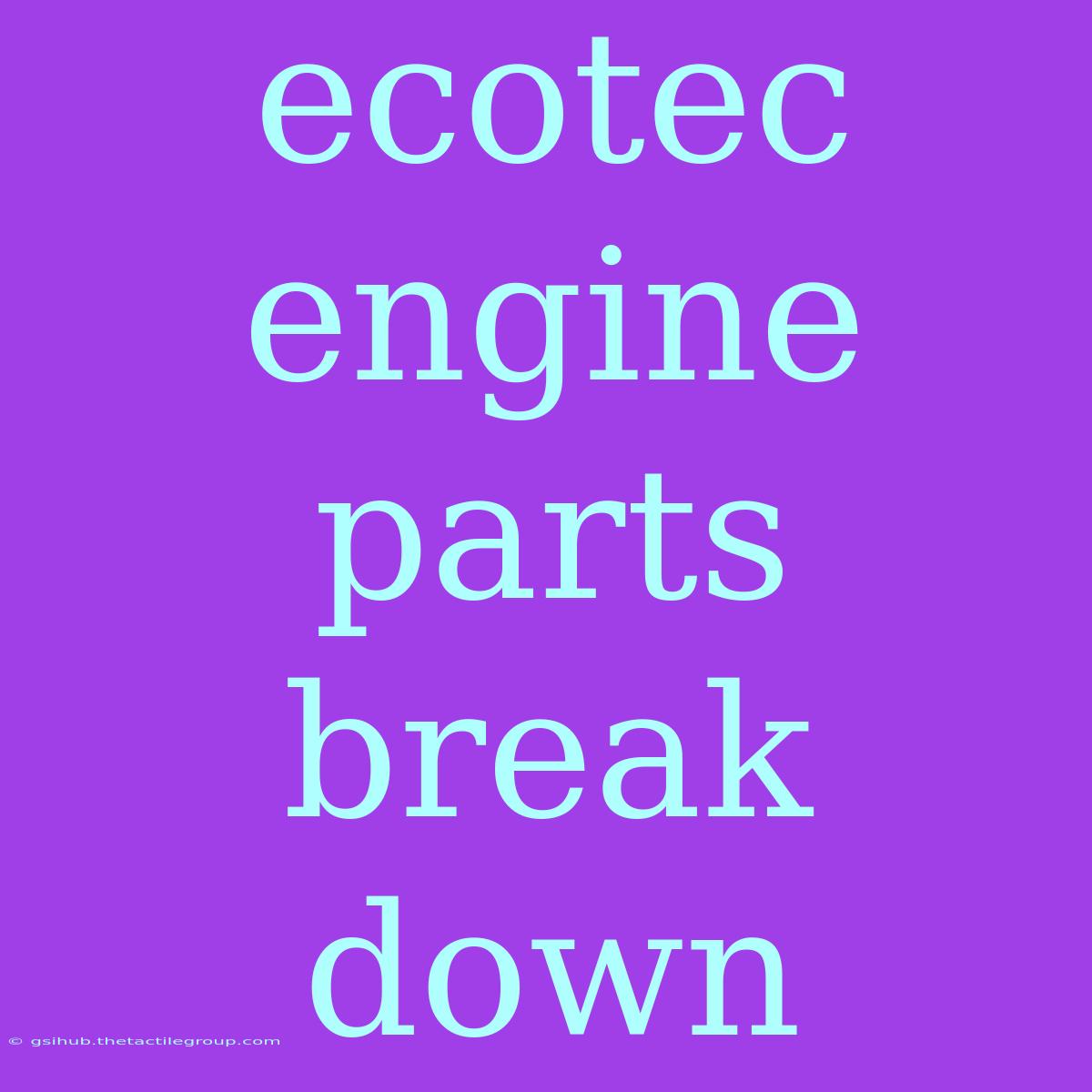Ecotec Engine Parts: A Comprehensive Breakdown
Is understanding Ecotec engine components crucial for optimal vehicle performance? Absolutely! This guide provides a detailed exploration of Ecotec engine parts, offering insights into their function and importance.
Editor's Note: This comprehensive guide to Ecotec engine parts has been published today to help car owners and enthusiasts gain a deeper understanding of their vehicle's engine.
Understanding Ecotec engine components is vital for maintaining peak engine performance, troubleshooting issues, and ensuring longevity. This guide provides critical information for car owners, mechanics, and enthusiasts alike. It covers key aspects, including common issues, maintenance needs, and part identification, using technical specifications and clear explanations.
Analysis: This guide is the result of extensive research, compiling information from various technical manuals, online forums, and expert consultations. The goal is to provide a single, easily accessible resource for all things Ecotec engine parts.
| Ecotec Engine Part Breakdown: Key Takeaways | Description | Importance |
|---|---|---|
| Cylinder Head | Houses valves, combustion chambers | Crucial for compression and combustion |
| Cylinder Block | Main engine structure, contains cylinders | Provides structural integrity and houses pistons |
| Piston & Rings | Reciprocating component, creates compression | Crucial for engine power and efficiency |
| Connecting Rods | Connects piston to crankshaft | Transmits power from piston to crankshaft |
| Crankshaft | Converts reciprocating motion to rotational motion | Key for engine power delivery |
| Camshaft | Controls valve timing | Dictates engine performance and efficiency |
| Valves (Intake & Exhaust) | Control airflow into and out of cylinders | Essential for combustion process |
| Timing Belt/Chain | Synchronizes crankshaft and camshaft rotation | Essential for proper engine operation |
| Oil Pump | Circulates engine oil | Lubricates engine components, prevents wear |
| Water Pump | Circulates coolant | Maintains optimal engine temperature |
Ecotec Engine Parts: A Detailed Exploration
Cylinder Head Assembly
Introduction: The cylinder head assembly is a critical component, directly impacting combustion efficiency and engine performance. Its intricate design necessitates careful maintenance and repair.
Facets:
- Role: Houses valves, spark plugs, combustion chambers. Manages airflow and fuel delivery.
- Examples: Various designs exist depending on engine specifications, including single or dual overhead cam (SOHC/DOHC).
- Risks & Mitigations: Warping due to overheating, valve train issues (burnt valves, sticking lifters). Regular maintenance, proper cooling system function, and timely repairs are crucial.
- Impacts & Implications: Failure can lead to low compression, power loss, overheating, and potentially catastrophic engine damage.
Piston and Connecting Rods
Introduction: The piston and connecting rod system translates combustion energy into rotational motion, forming the core of the Ecotec engine's power generation.
Further Analysis: Piston ring wear can lead to oil consumption and reduced compression. Connecting rod failure can result in catastrophic engine damage. Regular oil changes and attentive maintenance are paramount.
Closing: The intricate interplay between the piston and connecting rod directly determines engine efficiency and power output. Careful attention to their condition is crucial for engine longevity.
Timing System
Introduction: The timing system’s precise synchronization between the crankshaft and camshaft is fundamental to the Ecotec engine’s function. A malfunction can cause severe engine damage.
Further Analysis: Timing belt/chain failure can lead to bent valves or other internal engine damage. Regular inspection and replacement according to manufacturer recommendations are essential.
Oil and Cooling Systems
Introduction: These systems are vital for maintaining optimal operating temperatures and lubricating moving components. Neglect can drastically reduce engine life.
Further Analysis: Oil pump failure will lead to immediate engine damage due to lack of lubrication. Coolant leaks can result in overheating and catastrophic engine failure. Regular fluid checks and maintenance are vital.
FAQ
Introduction: This section addresses common questions about Ecotec engine parts.
Questions:
-
Q: What are the signs of a failing cylinder head gasket? A: White exhaust smoke, coolant leaks, overheating, loss of compression.
-
Q: How often should I replace my timing belt? A: Refer to your vehicle's maintenance schedule; replacement intervals vary based on model and engine.
-
Q: What causes low oil pressure in an Ecotec engine? A: Low oil level, failing oil pump, worn bearings, or clogged oil passages.
-
Q: How can I identify a worn piston ring? A: Excessive blue smoke from the exhaust, low compression, oil consumption.
-
Q: What are the symptoms of a bad camshaft sensor? A: Rough idle, misfires, lack of power, check engine light illumination.
-
Q: How do I know if my water pump is failing? A: Leaks, unusual noises (whining, squealing), overheating.
Summary: Understanding these common issues can help prevent costly repairs.
Tips for Maintaining Ecotec Engine Parts
Introduction: Proactive maintenance is crucial for extending the life of your Ecotec engine.
Tips:
- Use high-quality engine oil and change it regularly.
- Maintain proper coolant levels and ensure the cooling system is functioning correctly.
- Inspect the timing belt/chain regularly according to manufacturer recommendations.
- Address any unusual noises or leaks immediately.
- Regularly check for signs of wear and tear on all components.
- Follow the manufacturer's recommended maintenance schedule.
Summary: Regular maintenance directly translates to longer engine life and better performance.
Conclusion: Ecotec Engine Component Overview
This comprehensive guide has explored essential Ecotec engine components, outlining their roles, potential issues, and preventative measures. Understanding these elements empowers vehicle owners to make informed decisions about maintenance, repairs, and ultimately, ensuring the optimal performance and longevity of their vehicles. Regular inspections and adherence to the manufacturer's maintenance schedule are paramount to prevent costly repairs and ensure reliable operation.

